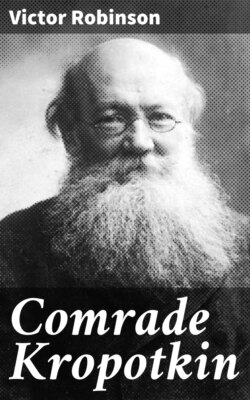Читать книгу Comrade Kropotkin - Victor Robinson - Страница 5
На сайте Литреса книга снята с продажи.
Footnote
ОглавлениеTable of Contents
[1] See "Russia," by Alfred Rambaud.
[2] Among those who witnessed this spectacle was Germain de Lagny, who describes it in his book, "The Knout and the Russians" ... "After fourteen hundred strokes, his face which had long before begun to turn blue, assumed suddenly a greenish hue; his eyes became haggard and almost started out of their sockets, from which large blood-colored tears trickeled down and stained his cheeks. He was gasping and gradually sinking. The officer who accompanied me ordered the ranks to open, and I approached the body. The skin was literally ploughed up, and had, so to say, disappeared. The flesh was hacked to pieces and almost reduced to a state of jelly; long stripes hung down the prisoner's sides like so many thongs, while other pieces remained fastened and glued to the sticks of the executioners. The muscles, too, were torn to shreds. No mortal tongue can ever convey a just idea of the sight.... It was seven months before he was cured and his health re-established; and, at the expiration of this period, he was solemnly taken back to the place of execution, and forced once more to run the gauntlet, in order to receive his full amount of six thousand strokes. He died at the commencement of this second punishment.... After all, Russia is only an immense barrack, in which every one is in a state of arrest." Yet the author of these words was a worshipper of Nicholas!
[3] They were called Cantonists because they were kept and trained in military settlements or cantons under Arakcheev. It is a most remarkable fact—considering the circumstance that they were taken away in early childhood—that several Cantonists who were able to live thru the horrors of the service, returned to their homes as orthodox and as fanatically devoted to their religion as if they had spent the preceding twenty-five years not in the military barracks of the gentiles, but in cheder and shool reciting the Torah.
[4] He slaughtered Poland like a hound tears a hare. "But below all (in the Museum of the Kremlin), far beneath the feet of the Emperor, in dust and ignominy and on the floor, is flung the very Constitution of Poland—parchment for parchment, ink for ink, good promise for good promise—which Alexander I. gave with so many smiles, and which Nicholas I. took away with so much bloodshed."—Andrew D. White, "The Development and Overthrow of Serfdom in Russia," Atlantic Monthly November 1862. This sentence which I have quoted is correct, but the reader who is unfamiliar with Russian history had better avoid the article, as the last paragraph alone contains as many lies as there are kalachi in Moscow.
